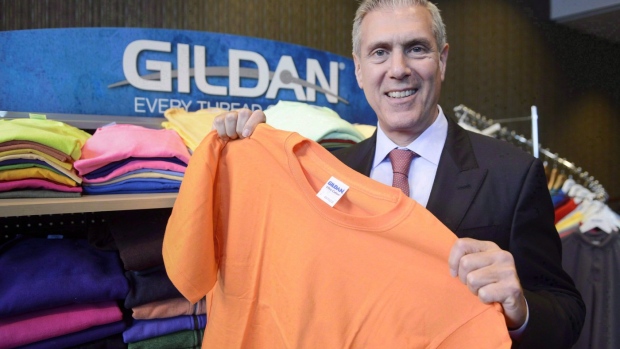As Glencore eyes Teck, Brad Wall sees echoes of 2010 battle for Potash Corp.
, The Canadian Press
Former Saskatchewan premier Brad Wall says he doesn't know enough of the details to take a public stance on the merits of mining giant Glencore PLC's ongoing hostile takeover bid for Teck Resources Ltd.
But the man who led his province's aggressive campaign to defend Potash Corp. of Saskatchewan against BHP Billiton in 2010 says there are clear similarities between that situation and what's going on now with the battle for Vancouver-based Teck.
He's also confident that in the case of Potash Corp., he and his government were in the right.
"Some things are worth fighting for. Some things are worth saying, 'No, this should be Canadian, this asset should remain Canadian,' " Wall said.
"I think it's reasonable to offer up the Potash Corp. thing as a bit of a cautionary tale."
The future of Teck, Canada's largest diversified mining company, is currently unclear. The company's board has said it remains opposed to any deal with Glencore, but the Swiss commodities giant has threatened to take its takeover offer directly to shareholders if necessary.
The turmoil over Teck has ignited sentiments of economic nationalism, especially from those who say homegrown mining companies will be necessary if Canada is to capitalize on expected future growth in demand for critical minerals like copper and zinc.
Wall, who is now a special adviser for a Calgary-based law firm, knows exactly where those feelings are coming from.
He felt very similar sentiments back in August 2010, when – while headed to the cinema with his wife Tami to watch the hit movie "Inception" – he got a call from then-Potash Corp. CEO Bill Doyle to tell him that Australian giant BHP was gunning for the Saskatoon-headquartered company.
"You kind of have to pay attention to that movie to follow it and enjoy it, and I clearly was not thinking of anything but the call I had just had," Wall recalled.
"Long afterwards "Inception" came out on video and we watched it again, and I said, 'I don't remember seeing any of this.' And that kind of tells you what you need to know.
"The transaction was that important."
Potash Corp., a former Crown corporation that had turned into one of Canada's most valuable companies, was an economic powerhouse for Saskatchewan. As the world's largest producer of potash, the company in 2010 owned five of the nine operating potash mines in the province and employed thousands of people.
Wall quickly sought the advice of people including former Alberta premier Peter Lougheed and former Saskatchewan NDP premier Roy Romanow, who both encouraged him to fight for his province and its natural resources. He then put together a "war room" that launched a public relations blitz from coast-to-coast on the merits of keeping the company Canadian.
The team also gathered evidence from past takeovers, arguing that the promises foreign companies often make in these cases – such as commitments to Canadian jobs or head office locations – often don't become reality.
Still, Wall did not know his government's campaign had been successful until November, when Conservative industry minister Tony Clement made the announcement in a media scrum that the federal government would block the proposed transaction, saying that BHP's offer did not translate to a "net benefit" for Canada.
It was only the second time since the Investment Canada Act came into force in 1985 that a federal government had used the legislation to block a foreign takeover.
"I was expecting that their answer would be 'Yes, with conditions.' In fact, I had written a speech for the press conference that day that anticipated that," Wall said.
"I was not ready for them to say no. I ended up having to flip over the first page of the speech I had written and just hand-wrote some notes on the back."
In 2018, Potash Corp. merged with Calgary-based Agrium Inc. to become what is now Nutrien Ltd. The company remains in Canadian hands and is the world's largest fertilizer producer.
And BHP Billiton is building its own massive potash mine, expected to be operational in 2026, east of Saskatoon.
Wall considers it a win, and says the fact that his Saskatchewan Party government was a conservative, free-market-leaning government did not dissuade him from wading into the fray.
"Our view was that, in Saskatchewan it's particularly true, but even for Canada as a whole, we don't have a lot of global champions," he said.
"And Potash Corp. was a global national fertilizer and potash champion and I think was, as I said, a very strategic asset for the country."
In the case of Glencore and Teck, B.C. Premier David Eby is opposed to a merger, while Opposition Leader Pierre Poilievre has called for the federal government to block any hostile takeover attempt.
Industry Minister François-Philippe Champagne has stopped short of a commitment but has spoken publicly about Teck's value as a Canadian company.
Barrick CEO says he has 'no intention' of pursuing Teck Deal
, Bloomberg News
Barrick Gold Corp.’s top executive is closely watching the takeover battle for Teck Resources Ltd. but has no plans to pursue the Canadian base metals producer, which has drawn a US$23 billion offer from Glencore Plc.
“We’re certainly learning from it and watching how that progresses,” Barrick Chief Executive Officer Mark Bristow said Wednesday in a BNN Bloomberg TV interview. “Right now we have no intention to join that process.”
Bristow said a lot of people are interested in Teck, though Glencore’s proposal carries a lot of synergies — including coal and copper assets in Chile — that means the deal “makes sense.”
Apr 27, 2023
Canadian Conservatives want proposed Glencore takeover of Teck blocked
, Bloomberg News
Canada’s main opposition party called for the government to block Glencore Plc’s proposed takeover of Teck Resources Ltd.
Thousands of jobs would be at risk if the Swiss commodities firm were to succeed in its unsolicited US$23 billion bid for the Vancouver-based miner, Conservative Leader Pierre Poilievre said in a statement Thursday. He warned it would also mark the loss of Canada’s last remaining major diversified base-metals miner owned and headquartered in the country.
“Canada needs a government that is committed to creating and supporting Canadian jobs,” Poilievre said. “Glencore’s attempted hostile takeover will ship thousands of jobs out-of-country and threaten thousands more Canadians who work for Teck.”
The opposition leader’s announcement ups the pressure on Prime Minister Justin Trudeau to take a stand on the issue. His finance and natural resources ministers have said in recent weeks that the government is watching the deal closely.
Teck is trying to fend off Glencore’s approach. But its plan to spin off its coal business suffered a major blow Wednesday when it withdrew the proposal for lack of support, hours before it was to be put to a shareholder vote.
Shares of Teck rose 1.3 per cent on Thursday to C$62.13 at 2:25 p.m. in Toronto, extending its gain this year to more than 22 per cent. Glencore closed the day down 1.7 per cent in London.
The deal is quickly becoming a broader political issue.
British Columbia Premier David Eby opposes it. And in a letter Monday to Vancouver’s board of trade, Deputy Prime Minister Chrystia Freeland said the nation needs companies like Teck in Canada as it prepares for the future of mining critical minerals key to the energy transition.
Any takeover of Teck would require the approval of the government. After a review, which could be lengthy, the final decision would mostly likely fall to Industry Minister Francois-Philippe Champagne, who signed Freeland’s letter alongside Natural Resources Minister Jonathan Wilkinson.
Canada blocked BHP Group’s proposed takeover of Potash Corp. of Saskatchewan in 2010, when Stephen Harper was prime minister. Poilievre was a member of that government.



